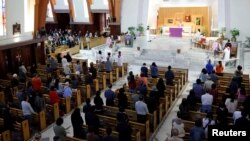The Vatican's most senior official after the pope has strongly defended an upcoming landmark deal between the Holy See and China from criticism by those who say it will be a sell-out to the communist government.
The Vatican and China have been in advanced talks this year to forge what would be an historic breakthrough and a possible precursor to a resumption in diplomatic relations after 70 years, with Secretary of State Cardinal Pietro Parolin among the chief architects.
Parolin told reporters he hoped the accord can be signed "in the not too distant future."
The accord, which Vatican sources said could be signed in Beijing as soon as next week, would give the Vatican a say in the naming of bishops and give the pope final veto power over candidates.
China's roughly 12 million Catholics are split between an underground Church that swears loyalty to the Vatican, and the state-supervised Catholic Patriotic Association.
The potential deal has divided communities of Catholics across China, some of whom fear greater suppression should the Vatican cede greater control to Beijing, but others want to see rapprochement and avoid a potential schism.
"There is no need to be drastic in condemning and rejecting," Parolin told reporters on the sidelines of a book presentation at the Vatican on Thursday night.
One such drastic critic is Cardinal Joseph Zen, the feisty, 76-year-old former archbishop of Hong Kong.
In an interview with Reuters in Hong Kong on Thursday night before Parolin spoke at the Vatican, Zen, in a highly personal attack on the pope's right-hand man, said Parolin should resign.
"I don't think he has faith. He is just a good diplomat in a very secular, mundane meaning," Zen said. "They're giving the flock into the mouths of the wolves. It's an incredible betrayal."
Parolin said: "Everyone has the right to think what they want but it has to be done in a respectful way. We are convinced that this is a step forward. We are not so naive as to think that from now on everything is going to go well, but it seems to us that this is the right direction."
Deal Provisional and won't be published
Vatican sources have said the complicated deal, which will not be published, is provisional so that it can be reviewed and fine-tuned.
Under the deal, the pope will lift the excommunication of several bishops who were appointed by the government-backed Church without papal approval. A few bishops appointed by Rome will cede their places to bishops who had been appointed by the Vatican.
The sources said that in the future, new bishops will be proposed by local members of the Church, together with the government and the Chinese bishops conference.
The names of candidates will be sent to the Vatican, which will carry out an investigation and the pope will make a final decision, they said.
This means that effectively all bishops on mainland China will recognize the pope's authority for the first time since about 70 years ago, when Beijing severed diplomatic ties with the Vatican.
At a time when the Vatican is also under over a host of sexual abuses scandals in several countries, with one archbishop even calling for the Pope to resign, Zen suggested this China deal would further add to the Church's vulnerability.
"The consequences will be tragic and long lasting, not only for the Church in China but for the whole Church because it damages the credibility. Maybe that's why they might keep the agreement secret," Zen said.
The Vatican has stressed the deal is strictly about the appointment of bishops and has nothing to do with Taiwan, which the Vatican still recognizes diplomatically.







